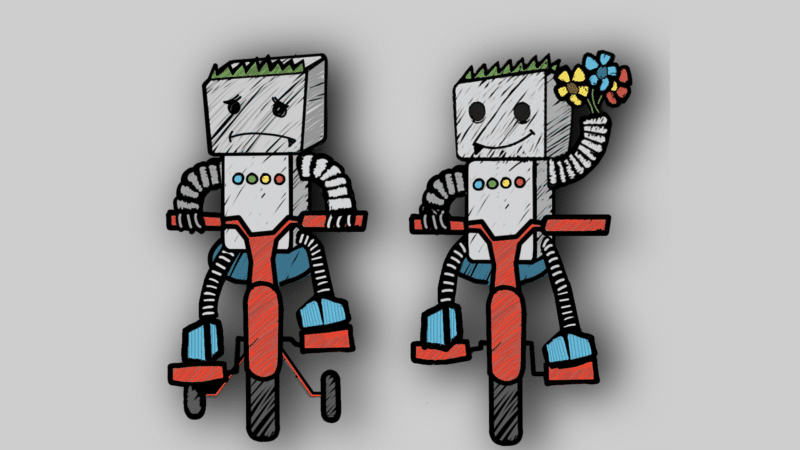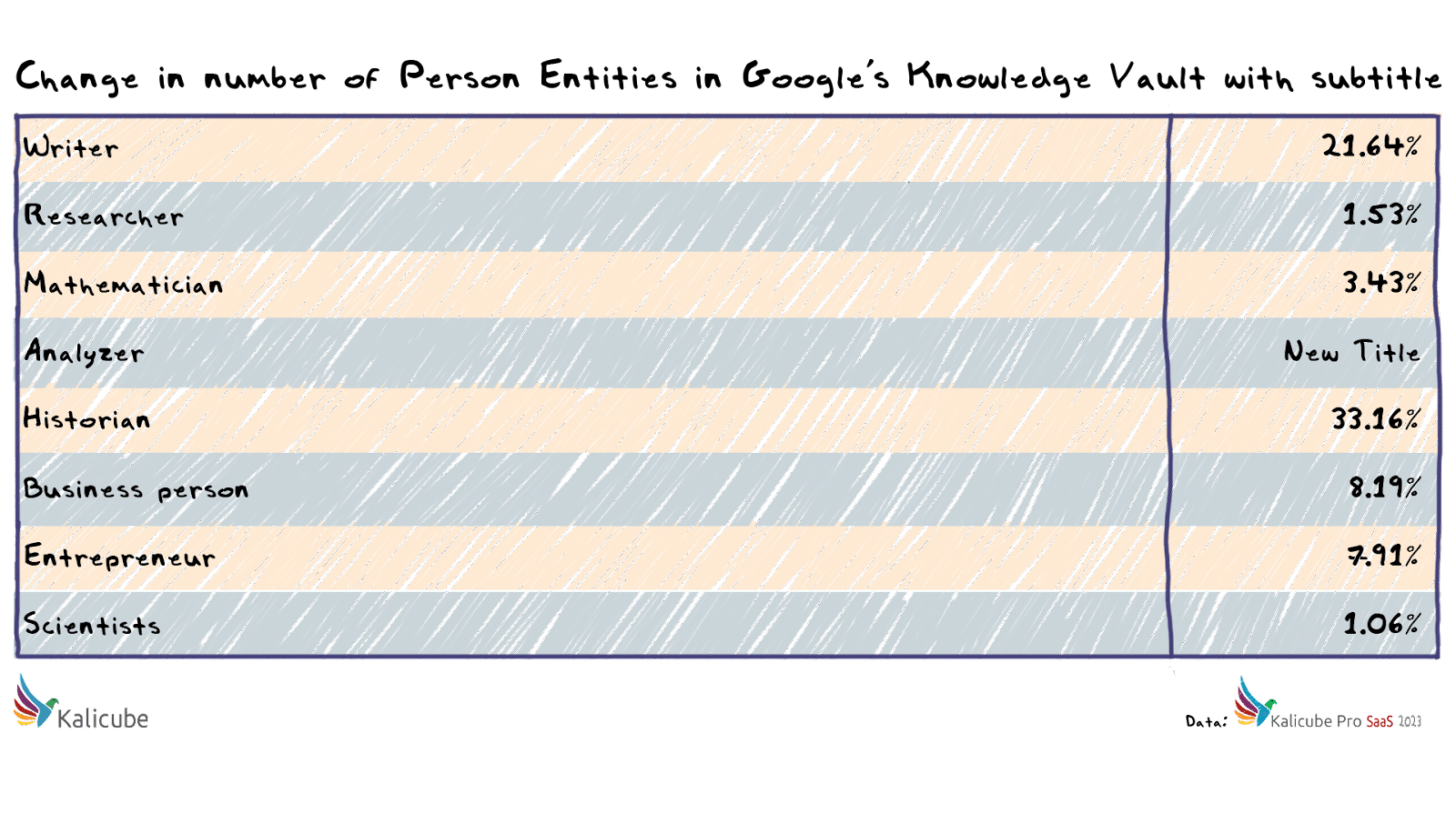I have been optimizing sites for search engines since 1998, the year Google was incorporated. In those 25 years, I never saw an update as big as the 2023 E-E-A-T Knowledge Graph update.
My team took a vote and chose a cheeky nickname for the update: Killer Whale (massive and making a big splash).
The Killer Whale update started in July 2023 as a considerable E-E-A-T update to the Knowledge Graph.
The unique feature of this Knowledge Graph update is that it cascaded into the August 2023 core update and possibly the October 2023 core update.
The July 2023 Knowledge Graph update focused on Person entities
The Knowledge Graph is Google’s machine-readable encyclopedia, memory or black box. It has six verticals, and the vertical this article is focusing on is the “Knowledge Vault.” The Knowledge Vault is where Google stores its “facts” about the world.
We started tracking Google’s Main Knowledge Graph (Knowledge Vault) in 2015 in our proprietary software, Kalicube Pro.
Google has performed a significant update to the Knowledge Vault every summer since 2015. The data we collect on each update illustrates a different focus, and each update’s focus is clearly visible in the data.
The July 2023 update had a clear focus. The number of Person entities in the Knowledge Graph tripled in four days (July 14–18, 2023), while the other entity types we track remained stable.
The chart below shows the number of entities of type “Person” and type “Corporation” in Google’s Knowledge Vault relative to the number in May 2020. As of June 2023, Person and Corporation entities were approximately five times the number in May 2020.
By September 2023, the number of Person entities had increased to a little under 20 times the number in May 2020, whereas Corporation entities remained stable at approximately five times.

Dig deeper: Entity SEO: The definitive guide
The July 2023 Knowledge Graph update focused on subtitles for people
Olga Zarr asked me why her subtitle had changed from “SEO Specialist” to “Writer” when Google announced that they had improved their classifier. Subtitles are a classifier for people. Did anything change there?
The short answer is, “Yes, massively.”
The changes Google Engineers made to subtitles suggest Google is looking to identify and clarify roles and has clearly focused on roles that are logical candidates for E-E-A-T signals.
For example, the number of Person entities with the subtitles “Writer” or “Author” increased by 21%.
Writers are the backbone of websites, so it makes sense for Google engineers to single out “Writer” as a focus. Writers have a specialist topic or subject of expertise, such as “SEO,” “Health,” “Finance,” “Sports,” and so on, which reinforces the E-E-A-T angle.
The other “winners” in the July 2023 E-E-A-T update stand out because (with no exceptions) they suggest roles to which E-E-A-T could reasonably be applied.
Winners are defined as an increase in Person entities with a given subtitle. (I have no idea what an “Analyzer” is, by the way.)
Sidenote: Several SEOs have contacted me and expressed frustration that their subtitle changed to “Writer.” I would argue it is a good thing for them, and they might want to keep it since for Google, they have become “an authoritative writer on the topic of SEO.”
+21%, +3%, +33%, +8%… these numbers seem small within the context of a threefold (218%) increase in the number of Person entities overall.
However, the E-E-A-T-friendly subtitles in the table above are (literally) the only ones that increased. Here are some examples of subtitle removals.
Before the update, 57.1% of Person entities in the Knowledge Vault had a subtitle. After the update, only 16.58% had one.
By comparison, the percentage of Corporation and Organization entities with a subtitle remained stable at 86.1%.
We can reliably conclude that:
- This update was all about Person entities.
- Focused on classification.
- Designed to promote E-E-A-T-friendly subtitles.
Reduced reliance on traditional knowledge sources
Much of Google’s Knowledge Vault was built on data from manually curated, structured third-party sources such as IMDB (film industry), MusicBrainz (music industry), government sites, and various sports sites.
The drops in subtitles for those ontologies (classifications) are a sign that Google just “let go” of those training wheels.
Google relies on the semantic relationships the algorithms build on entities, their attributes, and associations with other entities to curate their real-world fact base.

Dig deeper: Entities, topics, keywords: Clarifying core semantic SEO concepts
Reduced reliance on Wikipedia
The significant reduction in reliance on Wikipedia for Person entities in July 2023 adds undeniable credence that Google Engineers are removing the training wheels.
- Person entities triggered by Wikipedia in June 2023 were 40.9%.
- In September 2023, Wikipedia provided just 12.44% of all Person entities in the Knowledge Vault.
The reliance on Wikipedia for Corporations saw only a fractional change (and it was downwards, too):
- Corporation Entities triggered by Wikipedia in June 2023 were 13.83%.
- In September 2023, they were at 13.58%.
3 major takeaways from this Knowledge Vault update
The July 2023 Knowledge Graph update indicates clearly that Google is doing three things:
- Accelerating the growth of the Knowledge Vault (starting with Person entities).
- Restructuring the Knowledge Vault to focus on subtitles that are important for user trust to improve the algorithms’ application of E-E-A-T signals.
- Beginning the sunsetting of its dependence on Wikipedia and other human-curated sources.
What’s next: The next update will be Corporation entities
It is almost certain that Google will implement a similar reduction in reliance on Wikipedia for companies.
Probably in the next 12 months. If you or your clients build your Knowledge Graph/Panel strategy based on creating a Wikipedia article, you can confidently change that strategy and start building organically.
An organic Knowledge Panel is one that is built without reliance on Wikipedia, spam pseudo-Wikis, partner feeds or Google’s internal Knowledge Graphs (Books, Maps, Scholar, Podcast etc).
The post Inside Google’s massive 2023 E-E-A-T Knowledge Graph update appeared first on Search Engine Land.
via Search Engine Land https://ift.tt/9TqjsVE



No comments:
Post a Comment